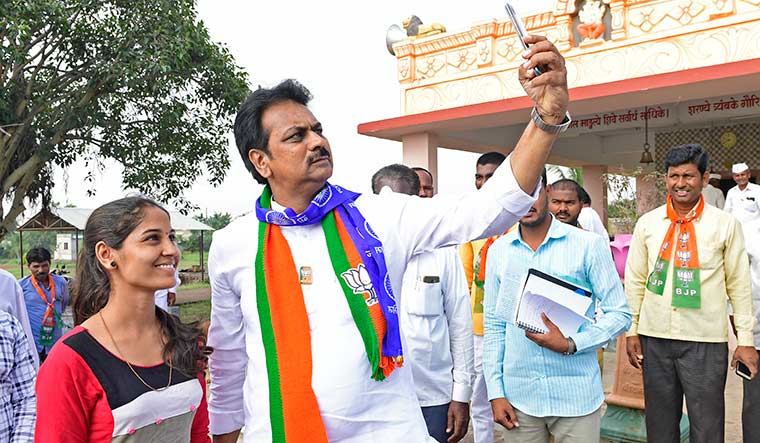The rich and fertile western Maharashtra—comprising Pune, Solapur, Kolhapur, Satara and Sangli districts—is a key region for any political party that aims to rule the state. It was a Congress stronghold for decades, before power shifted to Sharad Pawar and his newly-formed Nationalist Congress Party in 1999. The BJP and the Shiv Sena, which made inroads into western Maharashtra in 2014, are looking to consolidate their position by luring leaders from the Congress and the NCP.
A key battle is in Indapur, about 140km from Pune. Harshvardhan Patil won from here four times as a Congress candidate, and was minister from 1995 to 2014. He lost the 2014 election to Datta Bharne of the NCP, but wanted to contest again, even though the Congress and the NCP are allies this time. Since the NCP was not willing to give up the seat, Patil left the Congress to contest as a BJP candidate.
“Mala varyavar sodun dila [They left me twisting in the wind],” said Patil of the Congress. “The alliance partner (the NCP) had promised to leave this assembly seat for us. But they did not do so. There is anger in Indapur because of this injustice. So, at the request of the people, I joined the BJP.”
Patil’s entry is a shot in the arm for the BJP, since he is a Maratha strongman. Bharne, on the other hand, belongs to the Dhangar community. The battle lines are clearly drawn.
Situated on the banks of the Ujjani reservoir, Indapur is prosperous, but not without its problems. This year, the water in the dam dropped to alarmingly low levels. The demand to divert more water to the region is rising. Employment for the youth is also a major issue.
Patil has drawn up a five-year plan, saying Bharne failed to address the issues. “The biggest issue is water for farming,” he said. “The NCP legislator couldn’t handle the issue, so farmers suffered losses worth thousands of crores. There has been no development on the drinking water front, nor has any new business been set up here in the past five years. Many plants in the Indapur [industrial area] have started shutting down and joblessness is rising.”
The support of the Muslim community has boosted Patil’s chances, but what could prove decisive is the open backing of NCP leader Appasaheb Jagdale and his supporters. Every day, Patil addresses voters in 20 to 25 villages, and Jagdale attends some of the meetings. Apparently, Jagdale is angry that the NCP did not give him the party ticket.
“For the last couple of years, I have been highlighting water-related issues,” he told THE WEEK. “But the issue was largely ignored. I had 14 demands, including water and jobs for the local people. It is clear that the BJP-Shiv Sena alliance will return to power, so I thought it is essential to support the BJP leader if my demands are to be fulfilled.”
Bharne’s supporters say he has the backing of ordinary voters. Bharat Misal, who runs a tea stall at Nimgaon Ketaki village near Indapur, said Bharne always tried to address their problems and remained accessible.
Bharne himself is not worried by Jagdale’s support to Patil. “Leaders may go, but people do not,” he told THE WEEK. “I am a people’s man and I have their support, as I have done a lot of work for them. I am fully confident of winning.”


